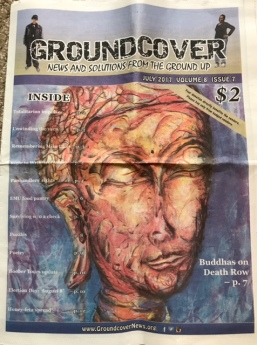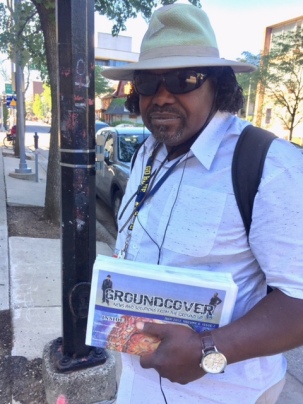I’ve done my share to kill traditional forms of media such as newspapers, periodicals and books — which is ironic, considering I’ve been a professional writer for all of my adult life.
Like many people, I no longer subscribe to the local papers and get most of my news online. No wonder the newspaper industry lost over half of its employment from 2001 to 2016.
The only real newspaper I buy is a little publication called Groundcover, whose mission is to create “opportunity and a voice for low-income people while taking action to end homelessness and poverty.”
The stories are sometimes better than what I read in the New York Times. A recent one covered the benefits of Buddhist meditation for prisoners on death row. There are essays on writing, including one that discussed it as a “grounding, healthy spiritual practice,” but warned “healing is more important than anything we could ever write, no matter how profound it might be.”
Groundcover vendors, who are often profiled in the publication, usually are the homeless and those suffering from mental illness. The little tabloid costs $2, but vendors accept free will offerings, everything ranging from a few coins to $20. The donations directly benefit the vendors.

I’ve gotten to know one of them. He is Lonnie Baker, a 56-year-old former homeless man, who is a silent sentinel in front of my church on Sundays, just blocks away from the University of Michigan. Unlike the newsboys of old, he doesn’t “hawk” the paper, but stands at the foot of the steps leading up to the church and simply holds up the latest edition.
I used to just stick a bill in his hand and hurry into 10 a.m. Mass. But then I decided to take the words of Pope Francis seriously. He said giving something to someone in need “is always right.” But he said it should be done with respect and compassion because “tossing money and not looking in (their) eyes is not a Christian” way of behaving.
 Looking into Lonnie’s eyes led to regular “hellos.” We learned each other’s names and that led to longer conversations. I found out he’s legally blind and only recently got his Social Security disability coverage. He used to live on the street but now has an apartment. He found out that I’ve been a writer all my life, at the Detroit News, People magazine and other publications and that I had been struggling to keep writing and being relevant despite the upheavals and job losses in my industry. He knows my granddaughter’s name and when someone in my family is sick.
Looking into Lonnie’s eyes led to regular “hellos.” We learned each other’s names and that led to longer conversations. I found out he’s legally blind and only recently got his Social Security disability coverage. He used to live on the street but now has an apartment. He found out that I’ve been a writer all my life, at the Detroit News, People magazine and other publications and that I had been struggling to keep writing and being relevant despite the upheavals and job losses in my industry. He knows my granddaughter’s name and when someone in my family is sick.
Lonnie’s marketing and people skills are impressive and give me encouragement.
The more I hung around, the more I realized that he has a steady stream of customers on Sunday. Sometimes there is a line of people waiting to chat with him or give him a coffee from Starbucks. He knows their names and their stories. Some give him hugs along with the donation. He is a model of persistence, hard work and how to react to setbacks.
“I start my week here at St. Mary’s and it’s a good start,” he told me. “I’m grateful. I sell the paper seven days a week for five hours a day. Some places it’s a lot harder, though. But I don’t give up. I try to remember everybody’s name.”
Winning customers at South University on the University of Michigan campus is the toughest, he said.
“Some days 1,000 people may go by me and I only get seven donations,” Lonnie said. “But there are other people standing by me who hand out radical literature. They (passers-by) may think I’m doing the same thing.”
I asked if it makes him angry when people act as if he’s invisible and he doesn’t succeed at his business.
“No, I pray for everyone who passes,” he said.

Another beautiful piece …. you captured the essence of your new friend.
This “invisible” man demonstrates insight, love, and compassion to those who breeze past him without acknowledging his presence, by praying for them. Thank you for sharing his story with us! Bless those who take the interest and time to get to know people without judgement. Interestingly, many of those entering their place of worship have difficulty living the message of acceptance and inclusion beyond those doors.
LikeLike